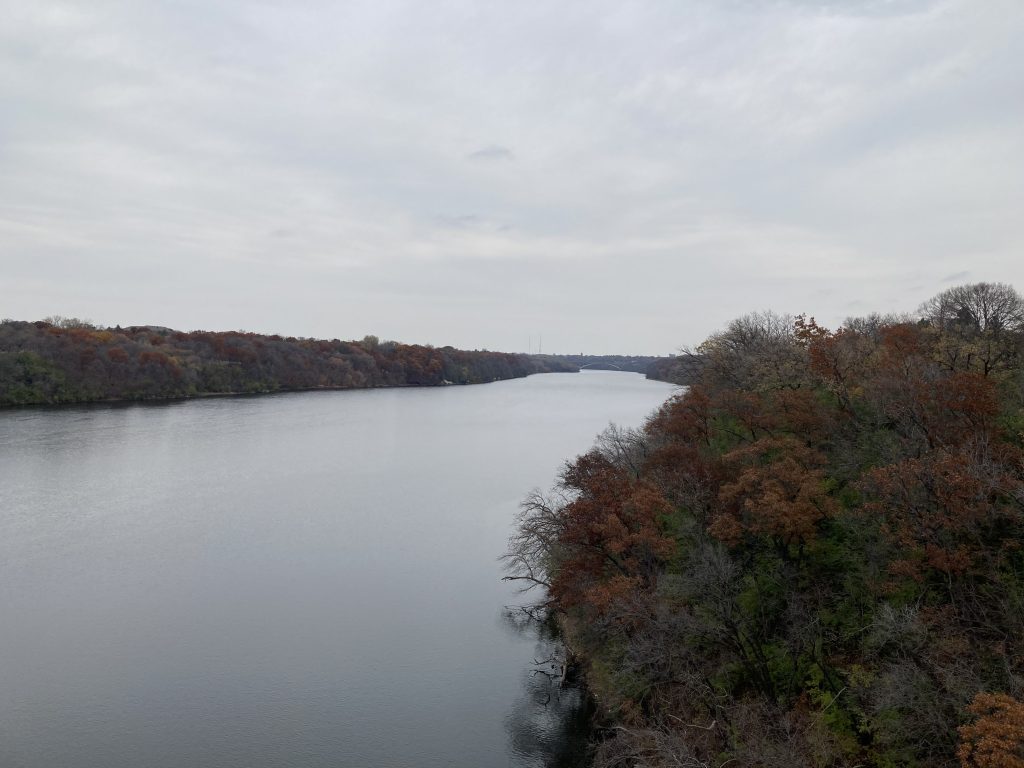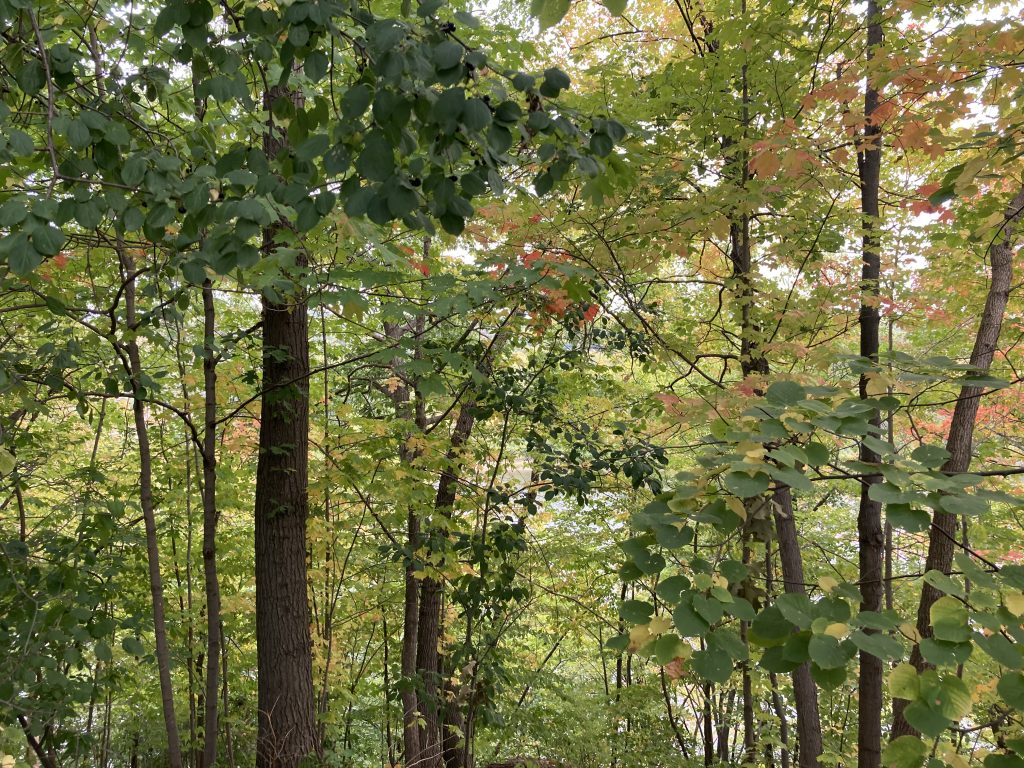3.45 miles
trestle turn around
48 degrees
Another run with no calf pain! Wore my compression sleeves again. My left IT band hurt a little and my legs felt heavy and tired, but no calf pain — victory!
IT fun: I think, I theorize, I twist, I triumph, is tall, is taught, is taut, is temerous*, is tiny, itchy tetherballs, iffy tire-swings, impossible teeter-totters
*temerous: this word appears several times in the great book I’m listening to right now: The Ten Thousand Doors of January
Today the river was brown. Is that all I remember about the run? There were a few moments it was easy, effortless, but mostly it felt difficult.
Heard lots of birds — lots of irregular, out-of-sync rhythms. A few drumming woodpeckers. My nose kept almost running. Thought I heard some voices down in the floodplain forest.
Ended at 7 Oaks. Recited “I felt a Funeral in my Mind” and thought about rhythms and interruptions and sense breaking through.
Before the run, I wrote about clocks, priming myself for noticing rhythms while I ran:
That 12-figured Moon Skull!
Today, I’m inspired by my march 6 entry from last year. Here’s what I wrote in that entry:
During the run I listened to the latest “Nobody Asked Us with Des and Kara.” They were talking about recent races, super shoes, fast times, and the future of track. Reflecting on how world records keep being broken Kara asked Des: “What do you think would happen if they took away the clock? Would the race still be exciting?” Des thought it could be, while my mind started wandering. First thinking about how I’ve been trying to forget the clock/watch and not care about pace — mostly, I’ve been successful. Second thinking about Clocks and how I’ve collected some lines (from poems and essays) about the clock, or what Mary Oliver calls it:
The clock! That twelve-figured moon skull, that white spider belly! How serenely the hands move with their filigree pointers, and how steadily! Twelve hours, and twelve hours, and begin again! Eat, speak, sleep, cross a street, wash a dish! The clock is still ticking. All its vistas are just so broad–are regular. (Notice that word.) Every day, twelve little bins in which to order disorderly life, and even more disorderly though. The town’s clock cries out, and the face on every wrist hums or shines; the world keeps pace with itself. Another day is passing, a regular and ordinary day. (Notice that word also.)
Upstream/ Mary Oliver
So many places to go with the idea of the Clock. Mary Oliver’s ordinary versus extraordinary time. Routines, habits, delight in the daily, repeated events. The Moment between time and its tight ticks, or right before something has happened, or when time (and sense) are disrupted. The time of the day dream. Outside of time and its relentless march forward, towards Death, motivated by progress. Losing time, syncing up with time. What other ways to we have for measuring meaning that don’t involve time passing?
Yes, so many ways to think about the idea of time and clocks!
interjection: Listening to an Apple playlist, ’70s Movie Essentials, and the song, “Time Warp” just came on.
pace definitions (from Merriam Webster)
- rate of movement, the runner’s pace, especially : an established rate of locomotionrate of progress
- specifically : parallel rate of growth or development, supplies kept pace with demand
- rate of performance or delivery : TEMPO, a steady pace, on pace to set a record, especially : SPEED
- rhythmic animation : FLUENCY
- a manner of walking : TREAD
- any of various units of distance based on the length of a human step
- GAIT, especially : a fast 2-beat gait (as of the horse) in which the legs move in lateral pairs and support the animal alternately on the right and left legs
- verb: paced; pacing — to walk with often slow or measured tread, to move along : PROCEED, to go at a pace —used especially of a horse
- to measure by pacing —often used with off: paced off a 10-yard penalty
- to cover at a walk — could hear him pacing the floor
- to establish a moderate or steady pace for (oneself)
- to keep pace with
my new pace: rhythm
I sink in
to a
rhythm: 3
then 2
First counting
foot strikes
then chanting
small prayers.
I beat out
meaning
until what’s
left are
syllables,
then sounds,
then something
new, or
old returned.
My rhythm for breathing, running, and writing. . .and for possessing favorite lines:
from “Practice”/ Ellen Bryant Voight
original:
at night in order to weep, to wait
for the whisker on the face of the clock
to twitch again, moving
the dumb day forward—
mine, in 3/2 rhythm:
wait for the
whisker
on the clock’s
face to
twitch again
to move
the dumb day
forward.
original:
if I came back as a bird
I’d remember that—
mine: 3/2
You — when I
come back
as a bird
will I
remember?
my new pace: a ghost, haunting the trails, inhabiting and possessing words and worlds
Was talking with two of the other clarinet players in band last night about the Calgon, take me away! commercial. Neither of them had heard of it; they’re Millennials. Does a Calgon, take me away, moment disrupt or resist or challenge capitalist time or reinforce it, or both?
Ross Gay and stopping capitalist time: from 29 march 2023
you, too, might’ve been praying for a way to stop the march of so-called time, and poems, sometimes, might do that. Poems are made of lines, which are actually breaths, and so the poem’s rhythms, its time, is at the scale and pace and tempo of the body, the tempo of our bodies lit with our dying. And poems are communicated, ultimately, body to body, voice to ear, heart to heart.9 Even if those hearts are not next to one another, in space or time. It makes them so. All of which is to say a poem might bring time back to its bodily, its earthly proportions. Poetry might make nothing happen. Inside of which anything can happen, maybe most dangerously, our actual fealties, our actual devotions and obligations, which is to the most rambunctious, mongrel, inconceivable assemblage of each other we could imagine.
Gay’s explicit connection to time and against capitalism resonates deeply for me. Stop those clocks, those planes, that machinery we’re using to destroy the planet, the future.
ED’s new grammar of humility and hesitation
Emily Dickinson took the scraps from the separate “higher” female education many bright women of her time were increasingly resenting, combined them with voracious and “unladylike” outside reading, and used the combination. She built a new poetic form from her fractured sense of being eternally on inteIlectual borders, where confident masculine voices buzzed an alluring and inaccessible discourse, backward through history into aboriginal anagogy. Pulling pieces of geometry, geology, alchemy, philosophy, politics, biography, biology, mythology, and philology from alien territory, a “sheltered” woman audaciously invented a new grammar grounded in humility and hesitation. HESITATE from the Latin, meaning to stick. Stammer. To hold back in doubt, have difficulty speaking. “He may pause but he must not hesitate”-Ruskin. Hesitation circled back and surrounded everyone in that confident age of aggressive industrial expansion and brutal Empire building. Hesitation and Separation. The Civil War had split American in two. He might pause, She hesitated. Sexual, racial, and geographical separation are at the heart of Definition.My Emily Dickinson
I really like this idea of hesitation and humility and aboriginal anagogy as a sharp contrast to progress, aggression, confidence/hubris, and time as always moving forwards (teleology). I tried to find a source that could explain exactly what Howe means by aboriginal anagogy but I couldn’t. I discovered that anagogy means mystical or a deeper religious sense and so, when I connect it to aboriginal, I’m thinking that she means that ED imbues pre-Industrial times (pre Progress!, where progress means trains and machines and cities and Empires and factories and plantations and the enslavement of groups of people and the increased mechanization of time and bodies and meaning and, importantly, grammar) with the sacred.
Hesitant
humble —
Okay, now I should go out for a fun. Should I pay attention to rhythms? Chant in triple berries? Look for disruptions? Focus on my breaths?
On my run, I listened to many different rhythms not quite in sync with my own and thought about interruptions and disruptions and how my breathing rhythm is sometimes how I breathe when I run and sometimes my imagined rhythm — real, embodied and also not real, the rhythm I’d like to have.
Concluded the run with an idea that I spoke into my phone: “Regular” time is necessary — I want the conveniences it allows for! — but we need to safeguard that space outside of that time. Poets do that. I try to do that, to keep the door open to that time/space for others.
I’ll end with a wonderful time poem:
[My favorite time is in time’s other side]/ Etel Adnan
My favorite time is in time’s other side, its other identity, the kind that collapses and sometimes reappears, and sometimes doesn’t. The one that looks like marshmallows, pomegranates, and stranger things, before returning to its kind of abstraction. I used to be fond of time as it was a matter that helped us feel intelligent. Those days have gone to where days go, in their own cemeteries. Today I see eternity everywhere. I had yesterday an empty glass of champagne on the table, and it looked both infinite and eternal, though it left me indifferent. At least, I was in good company, and a day closer to all sorts of annihilations.
cemeteries for gone days — to see eternities everywhere — time that looks like pomegranates and marshmallows

